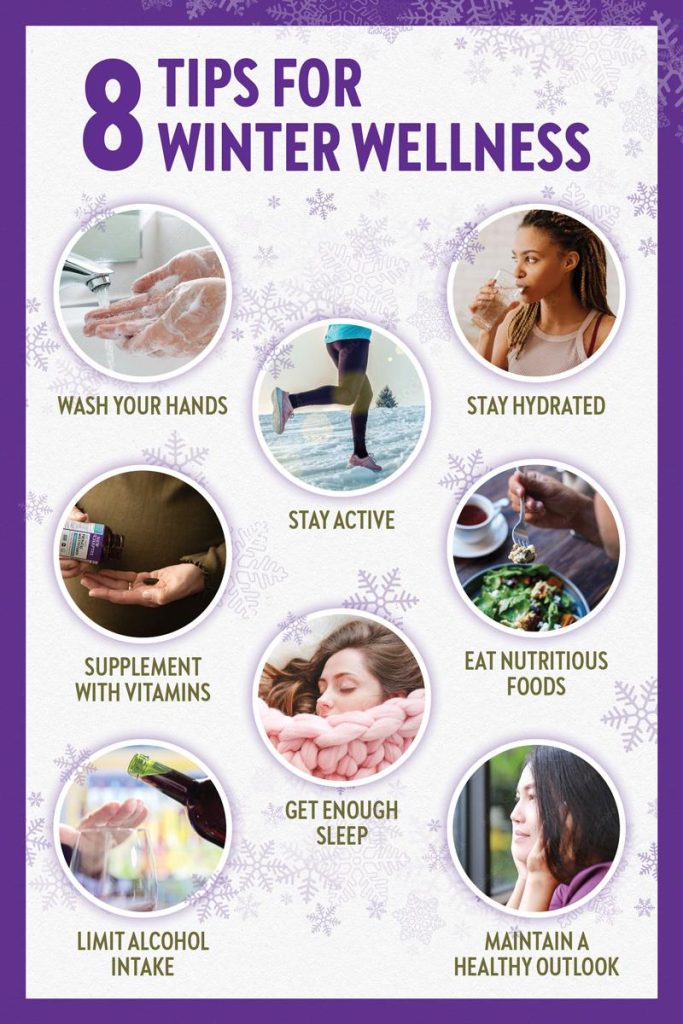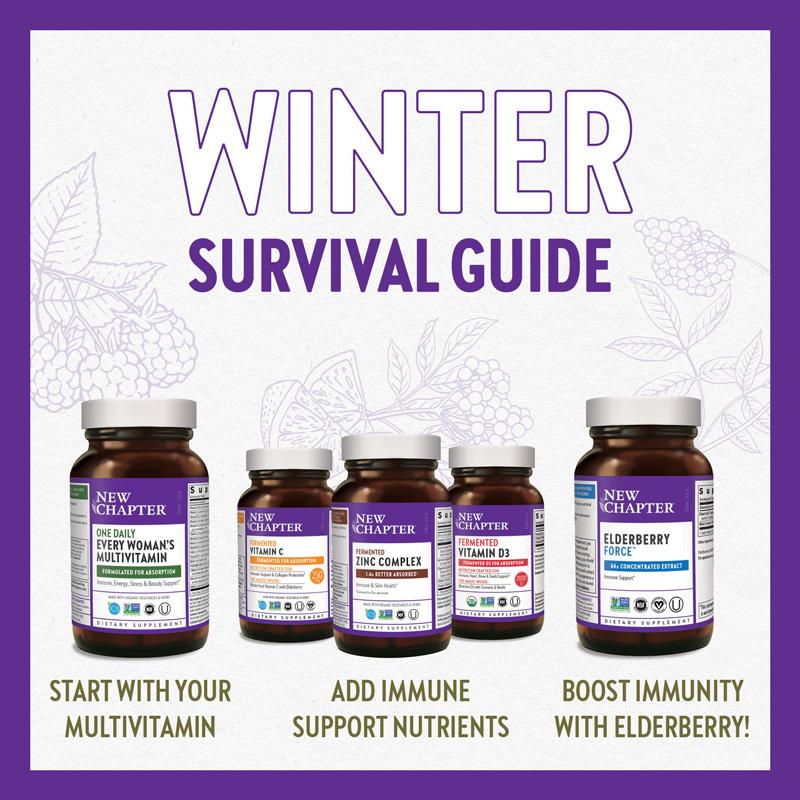
This time of year, as temperatures drop and more of our daily activities move indoors, it is especially important to take extra steps to boost your immune system and prevent bacteria and viruses from taking hold. Staying healthy during the winter does not have to be hard! Try adding some or all 8 of these simple tips to your daily routine to stay in good spirits and help yourself avoid seasonal challenges.

Tip #1: Wash Your Hands
Germs are easily spread by hands when you touch surfaces, food, other hands, or even your own eyes and nose—and just think how often each happens in less than 24 hours! That is why washing your hands properly throughout the day is crucial. Washing thoroughly is especially key before and after any events or activities where germs are prevalent.
Remember to lather with soap and water and scrub your palms, the backs of your hands, in between your fingers, and under your nails. In all, it should take about 20 seconds to properly disinfect your hands. (Most know by now that singing Happy Birthday twice through is an easy way to time it. If that has gotten stale, try any of these that NPR compiled.)
Tip #2: Stay Hydrated
Staying hydrated is just as crucial in the winter as it is in the summer. The drier winter air created by indoor heating systems might actually lead to increased water loss just from breathing, not to mention the havoc it can wreak on the nasal passages. Your mucus acts like a sticky flytrap to keep infections from going any further, so when it gets dried out, germs can more easily take hold.
If drinking ice-cold water does not hold much appeal in the winter months, switch to a mug of something steamy, like herbal tea or even hot chocolate. Also helpful: many fruits and vegetables are 90–95% water! Yet another reason to get your 5+ servings a day.
Tip #3: Stay Active
Do not let the weather report keep you from your daily workout. Exercising in colder temperatures actually has some surprising benefits: your heart doesn’t have to work as hard, you sweat less, and you expend less energy. All in all, it may make for a more efficient workout.
A past study on how temperature affects the body suggests that simply the act of shivering in the cold can help transform stubborn belly and thigh fat into calorie-burning fat. Imagine what a workout on top of that could do! Plus, it gets you sun exposure, which can help ward off seasonal affective disorder and keep your mood lifted. (Just do not skip the sunscreen, even in December.) Exercise has the added benefit of releasing mood-lifting endorphins.
Tip #4: Eat Nutritious Foods
When sleet and ice hit, we often turn to our favorite comfort foods to warm us up. Try to limit your intake of butter, cream, and cheese and go for plenty of antioxidant-rich fruits and veggies instead. Proper nutrition actually helps support your immune system, providing it with energy and nutrients so it can continue to function optimally. (There is a reason for the saying “feed a cold”—though you should feed a fever, too!) Want to balance the urge for something cozy and the need for nutrition? Try healthy variations, like lentil or chicken soup that can feel warming from top to toe.
Tip #5: Supplement Your Diet With Vitamins

Maybe it is a lack of summery produce or maybe it is just your ever-present busy schedule—whatever the reason, you might need to up your vitamin intake this winter with the help of daily supplements.
Vitamin C has built a reputation as a go-to when cold symptoms pop up, but you can also take it regularly before you start to feel under the weather. Vitamin C contributes to your immune system’s natural defenses, helping keep pathogens out and promoting the fight against oxidative stress.* On the flip side, a Vitamin C deficiency impairs your immune system and makes you more susceptible to infections. Keep your daily intake dialed in by adding New Chapter’s Fermented Activated C Complex supplement to your routine.
Vitamin D3 is crucial because it helps our body absorb calcium and develop strong, healthy bones.* Plus, it also supports your immune system and heart health*! The sun is one natural source of Vitamin D, but in dark winter months, we might not get much exposure to it. That is why it is important to supplement your daily dose with foods like fish, beef liver, and egg yolks, or vitamin tablets. New Chapter’s Fermented Vitamin D3 is easily digestible and includes Turmeric and adaptogenic Reishi mushroom to give you a superfood boost.
Elderberries have long been used as a natural remedy for ailments. The berries are high in natural antioxidants that make them a useful addition to your immune defense regimen. New Chapter’s Immune Defense Vitamin C + Elderberry helps you maximize your Vitamin C intake and is made with pure Elderberry.
Other immune-supportive ingredients to look for are Zinc, certain types of mushrooms, Holy Basil, and Oregano. Each one has benefits for supporting the immune system!
Tip #6: Get Enough Sleep
Your body uses sleep as a time to repair and heal everything from blood vessels to individual cells. While those with chronic pain issues often see their sleep suffer as a result, studies have shown that the relationship works both ways. Those who get poor or shortened sleep may experience heightened sensitivity to pain or be at higher risk of developing conditions like migraines or fibromyalgia.
Your immune system benefits from sleep, too. Without quality rest, your defenses can have trouble fighting off common infections.
Tip #7: Limit Alcohol Intake
More time inside can easily lead to more cocktails or glasses of wine than you would normally drink. But excessive alcohol intake has been linked to impaired immune response, defense against infection, and injury repair. You risk becoming more vulnerable to flu season if you overdo it with your alcoholic beverages—not to mention, there’s the year-round threat of hangovers.
The CDC recommends limiting your intake to just 1–2 alcoholic drinks per day (or do not drink at all) due to the potential link between alcohol and cancer or cardiovascular disease. If your schedule is packed with holiday parties this winter, consider spacing out your drinks with water or other alcohol-free beverages. You can keep yourself on track even while celebrating.
Tip #8: Maintain a Healthy Outlook
Our bodies are naturally regulated by the sun. When the days get shorter, but our schedules do not it can throw off our mood and energy levels. Even if winter in your area does not equate to snow, sleet, and ice, you may still feel affected by darker mornings and earlier evenings.
How to offset this phenomenon? Make a concerted effort to monitor your mental health and take extra care to boost your spirits, especially in the post-holiday months. Meditation and mindfulness practices, as well as time spent with family and friends, can all help keep you feeling positive this winter.
We all know that winter is coming. We hope that by prioritizing some or all these tips, you can easily make it through the coming months healthy, happy, and (dare we say it?) loving this part of the year.

See the original article by New Chapter here
*These statements have not been evaluated by the Food and Drug Administration. This product is not intended to diagnose, treat, cure, or prevent any disease. © Copyright 2021 New Chapter, Inc

